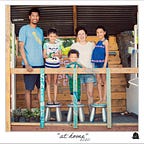Zooming Through Emotions
Helping Children Understand Disappointment Instead of Zooming to a Virtual Birthday Party
The cancellation of a four hour birthday party for my 5 year old, on a Saturday in sunny San Diego, indoors, at a bounce world, was the first moment of relief I found in these trying times. One by one the parties were postponed and while the parents seemed more distraught then the children, unlike our current pandemic, a cancelled 80’s themed roller skating party, was not the end of the world. But then something changed.
An evite showed up on my phone, and in my email. A follow up text was sent as a reminder to check my phone and my email for the Zoom party scheduled so my 8 year old could spend two hours on the phone, with 20 kids, yelling on top of each other. For those who couldn’t attend, the email also listed available time slots for one-on-one calls, a registry on amazon, or the option to send a birthday video. The parents were pleased with themselves, for pulling off a celebration.
The reality is, it was hard for me to get to the birthday party before the pandemic. I didn’t always have the energy to bring myself to unbuckle and rebuckle all three of my children in and out of their carseats more than four times in one hour, only to have to survive buying a present at Target without spending $100 on snacks, while only ⅓ of my children could attend the party but a parent must be present.
I couldn’t have imagined it would get harder, and yet now, it’s even harder. At home teaching a preschooler, kindergartener, and second grader, while also lecturing my own classes of college students, remembering what day it is, is already too much. Adding a zoom call at 10 am on a Saturday, followed by a car parade at noon drove me to a realization. Sending an evite to a zoom celebration is easy. Guiding our children through disappointment is not.
Taking a step back, parents and children, can both learn from RSVPing ‘no’ and instead asking ourselves why we say ‘yes.’ Taking a timeout now, can help develop a tool box for kids to use now and later in life. In a time when no one has the answers, it’s a helpful reminder to ask more questions.
Set reasonable expectations. Why are we asking even more of each other? How can we adjust our list of “to do” into “not now”?
Simplify. What can make a celebration fun? Can baking a cake together and licking the icing off the spoon be enough?
Refocus. What makes a celebration at home special? What did we accomplish this past year?
Acknowledge. Did you know, we miss our friends too? Parents just like children, also miss their friends.
Talk. Chocolate or strawberry? Even if it’s asking what flavor ice cream cake to buy, creating a space for dialogue can be a gateway to more serious conversations.
Feel. Use your senses. What does disappointment feel like? Does it feel like a volcano erupting? Identifying the feelings and how to process them, keeps them from being bottled up.
Imagine. What would you wish on a four leaf clover could be different next time? What does a fun day at home look like?
Let go. When things don’t go our way, what can we do? Throw rocks in a puddle? Should we draw something together or run around outside?
An opportunity for children to understand their emotions while figuring out how to respond to them, is creating a learning tool box, that they can come back to on their own, when they need help managing. Taking the time to talk with a child to understand the emotions involved is a learning opportunity. It can teach kids to be resilient. It also allows parents to reflect on their intentions. Expectations are too high right now. Of ourselves, of our families, for a cure, for a new normal. Personally, I’ve lowered the bar for everything right now and it’s the one thing that feels good.
Eventually, we will all come back together. The frosting will seem sweeter, the hugs will feel tighter. Looking back on the one year we celebrated at home, just us, may stand out amongst all the other birthdays, hopefully reminding all of us, the day itself is a gift, and everything else is just icing on the cake.
Jessica Keith is a professional lecturer at San Diego State University, and as the mother of three littles (ages 2, 5, and 8). When she is not raising her own tiny humans, she is in the classroom teaching Cultural Adaptation.
